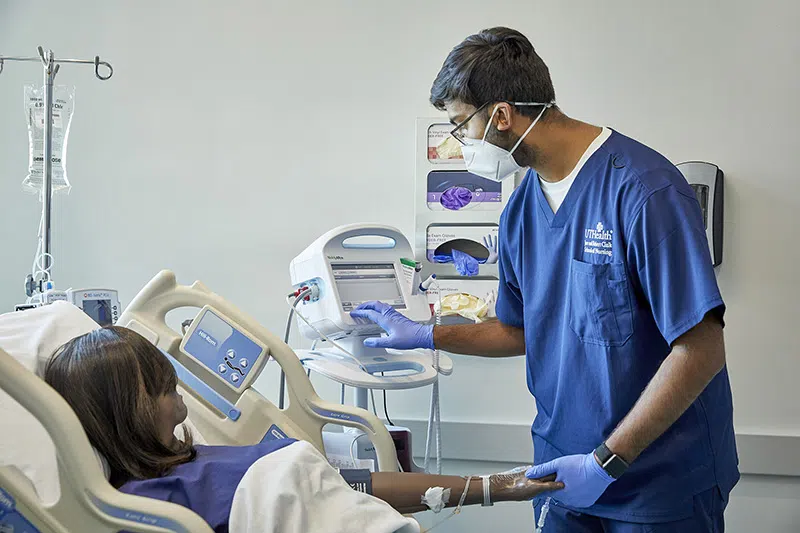POLICY
Prisoners are a vulnerable population and require additional protections to be in place when such persons are included in research. Research at UTHealth may not involve prisoners as subjects unless inclusion of prisoners has been approved by the IRB according to this policy.
If the subject population has an increased potential to become prisoners and the Principal Investigator will be interacting, intervening or collecting identifiable private information during the possible incarceration, the IRB may review the research under this policy.
IRB Membership: For review and approval of research involving prisoners, the IRB membership should, in addition to the standard membership described in policy and procedure IRB Membership, meet the following criteria:
- A majority of the IRB shall have no association with the prison(s) involved, apart from their membership on the IRB.
- At least one member of the IRB must be a prisoner representative with appropriate background and experience to serve as an advocate, except that where a particular research project is reviewed by more than one IRB, only one IRB need satisfy this requirement.
- At the convened IRB meeting reviewing research involving prisoners (including initial review, continuing review, review of protocol modifications, and review of unanticipated problems involving risks to participants or others), the prisoner representative must be in attendance as a voting member and must receive and review all materials pertaining to the research (same as primary reviewer).
Permitted Research Involving Prisoners: The IRB may approve research only if it finds and documents that the research falls under one of the following categories:
- A study of the possible causes, effects, and processes of incarceration, and of criminal behavior, provided that the study presents no more than minimal risk and no more than inconvenience to the participants; or,
- A study of prisons as institutional structures or of prisoners as incarcerated persons, provided that the study presents no more than minimal risk and no more than inconvenience to the participants; or,
- Research on conditions particularly affecting prisoners as a class (for example, vaccine trials and other research on hepatitis which is much more prevalent in prisons than elsewhere; and research on social and psychological problems such as alcoholism, drug addiction, and sexual assaults) ;or
- Research on practices, both innovative and accepted, which have the intent and reasonable probability of improving the health or well-being of the participant; or
- Epidemiologic studies whose sole purposes are either (i) to describe the prevalence or incidence of a disease by identifying all cases or (ii) to study potential risk factor associations for a disease.
Key Terms
Prisoner: Prisoner means any individual involuntarily confined or detained in a penal institution, including individuals sentenced to such an institution under a criminal or civil statue, individuals detained in other facilities by virtue of statutes or commitment procedures which provide alternatives to criminal prosecution or incarceration in a penal institution, and individuals detained pending arraignment, trial, or sentencing.
Minimal Risk: Minimal risk for a prisoner means that the probability and magnitude of physical or psychological harm that is normally encountered in the daily lives, or in the routine medical, dental, or psychological examination of healthy persons.
PROCEDURE
Submission: In addition to the submission requirements for initial review described in policy and procedure, Initial Review, the PI must complete the application panel on research involving prisoners. Documentation of approval from the detention or correctional facility involved must be submitted to the IRB.
Assigning Reviewers: IRB Staff will schedule initial review for all research involving prisoners for review at a Full Board meeting. IRB Staff will ensure that the subcommittee that reviews the research has at least one prisoner advocate.
For research that does not involve interaction with prisoners (e.g. existing data, record review), the research may be reviewed by the expedited procedure, if a determination is made that the research involves no greater than minimal risk to the prison population being studied. The prisoner representative may review the research as a expedited reviewer.
Review Process: In addition to the criteria for approval outlined in policy and procedure Initial Review, the IRB has additional responsibilities when reviewing research involving prisoners. The IRB must determine that:
- The research represents one of the categories of research permissible as noted above.
- Any possible advantages accruing to the prisoner through his or her participation in the research, when compared to the general living conditions, medical care, quality of food, amenities and opportunity for earnings in the prison, are not of such a magnitude that his or her ability to weigh the risks of the research against the value of such advantages in the limited choice environment of the prison is impaired.
- The risks involved in the research are commensurate with risks that would be accepted by non-prisoner volunteers.
- Procedures for the selection of participants within the prison are fair to all prisoners and immune from arbitrary intervention by prison authorities or prisoners. Unless the Principal Investigator provides to the IRB justification in writing for following some other procedures, control participants must be selected randomly from the group of available prisoners who meet the characteristics needed for that particular research project.
- The information is presented in language which is understandable to the participant population.
- Adequate assurance exists that parole boards will not take into account a prisoner’s participation in the research in making decisions regarding parole, and each prisoner is clearly informed in advance that participation in the research will have no effect on his or her parole.
- Where the IRB finds there may be a need for follow-up examination or care of participants after the end of their participation, adequate provision has been made for such examination or care, taking into account the varying lengths of individual prisoners’ sentences, and for informing participants of this fact.
For research under OHRP oversight, the IRB shall inform the PI that no prisoners may be enrolled into the study until the IRB receives confirmation from OHRP.
Documentation: The IRB shall document the category under which the research is permissible and how each of the above criteria for additional protection are met. This shall include protocol-specific information justifying each IRB finding.
Reporting: If research involving prisoners is conducted or supported by DHHS, the IRB Staff will inform the OHRP that the IRB has reviewed and approved the research. The letter shall contain all the items described in research involving prisoners – Template Letter to OHRP.
Incarceration of Subject in Research Not Approved Under this Policy: If a participant becomes a prisoner while enrolled in a research study that was not reviewed according to this policy, the IRB staff will work with the study team to:
- Confirm that the participant meets the definition of a prisoner.
- Terminate enrollment or review the research study under this policy if it is feasible for the participant to remain in the study.
- Before terminating the enrollment of the incarcerated participant, the IRB should consider the risks associated with terminating participation in the study. If the participant cannot be terminated for health or safety reasons:
- Keep the participant enrolled in the study and review the research under this policy.
- If some of the requirements of this policy cannot be met, but it is in the best interests of the participant to remain in the study, keep the participant enrolled and inform OHRP of the decision along with the justification.
- Remove the participant from the study and keep the participant on the study intervention under an alternate mechanism such as compassionate use, off label use, etc.
If a participant is incarcerated temporarily while enrolled in a study:
- If the temporary incarceration has no effect on the study, keep the participant enrolled.
- If the temporary incarceration has an effect on the study, handle according to the above guidance.
Research including prisoners and non-prisoner populations - CPHS may approve a research proposal for non-prisoner populations until all the criteria in this policy are satisfied.
Research Involving Children who are Prisoners - When a prisoner is also a minor (e.g. an adolescent detained in a juvenile detention facility is a prisoner), the IRB will follow the policy and procedure for research involving prisoners as well as research involving children.
For research supported by National Institute of Justice:
- All projects are required to have a privacy certificate approved by the NIJ Human Subjects Protection Officer.
- All researchers and research staff are required to sign employee confidentiality statements, which are maintained by the responsible researcher.
- The consent document must disclose the name(s) of the funding agency(ies).
- A copy of all data must be de-identified and sent to the National Archive of Criminal Justice Data, including copies of the informed consent document, data collection instruments, surveys, or other relevant research materials.
- At least once a year, the researcher shall provide the Chief, Office of Research and Evaluation, with a report on the progress of the research.
- At least 12 working days before any report of findings is to be released, the researcher shall distribute one copy of the report to each of the following: the chairperson of the Bureau Research Review Board, the regional director, and the warden of each institution that provided data or assistance. The researcher shall include an abstract in the report of findings.
- In any publication of results, the researcher shall acknowledge the Bureau's participation in the research project.
- The researcher shall expressly disclaim approval or endorsement of the published material as an expression of the policies or views of the Bureau.
- Prior to submitting for publication the results of a research project conducted under this subpart, the researcher shall provide two copies of the material, for informational purposes only, to the Chief, Office of Research and Evaluation, Central Office, Bureau of Prisons.
For research conducted within the Bureau of Prisons, UTHealth, the IRB, and researchers and research staff must follow the requirements of 28 CFR 512, including:
- The project must not involve medical experimentation, cosmetic research, or pharmaceutical testing.
- The research design must be compatible with both the operation of prison facilities and protection of human participants. The researcher must observe the rules of the institution or office in which the research is conducted.
- Any researcher who is a non-employee of the Bureau must sign a statement in which the researcher agrees to adhere to the provisions of 28 CFR 512.
- All research proposals will be reviewed by the Bureau Research Review Board.
- A non-employee of the Bureau may receive records in a form not individually identifiable when advance adequate written assurance that the record will be used solely as a statistical research or reporting record is provided to the agency.
- Except as noted in the consent statement to the participant, the researcher must not provide research information that identifies a participant to any person without that participant’s prior written consent to release the information. For example, research information identifiable to a particular individual cannot be admitted as evidence or used for any purpose in any action, suit, or other judicial, administrative, or legislative proceeding without the written consent of the individual to whom the data pertain.
- Except for computerized data records maintained at an official DoJ site, records that contain non-disclosable information directly traceable to a specific person may not be stored in, or introduced into, an electronic retrieval system.
- If the researcher is conducting a study of special interest to the Office of Research and Evaluation (ORE) but the study is not a joint project involving ORE, the researcher may be asked to provide ORE with the computerized research data, not identifiable to individual participants, accompanied by detailed documentation. These arrangements must be negotiated prior to the beginning of the data collection phase of the project.
- In addition to the elements of disclosure in the consent forms described in the policy on Informed Consent, consent forms must also include:
- The identity of the researchers.
- Anticipated uses of the results of the research.
- The extent to which confidentiality of records identifying the participant will be maintained. For studies sponsored by NIJ, the participant should be informed that private, identifiable information will be kept confidential and will only be used for research and statistical purposes. If, due to sample size or some unique feature, the identity of the individual cannot be maintained, the participants need to be explicitly notified. If the researcher intends to disclose any information, the participant needs to be explicitly informed what information would be disclosed, under what circumstances, and to whom. The participant must be informed of any risks that might result from this disclosure and must explicitly provide written consent prior to participating in the research.
- A statement that participation is completely voluntary and that the participant may withdraw consent and end participation in the project at any time without penalty or prejudice (the inmate will be returned to regular assignment or activity by staff as soon as practicable).
- A statement regarding the confidentiality of the research information and exceptions to any guarantees of confidentiality required by federal or state law. For example, a researcher may not guarantee confidentiality when the participant indicates intent to commit future criminal conduct or harm himself or herself or someone else, or, if the participant is an inmate, indicates intent to leave the facility without authorization.
- A statement that participation in the research project will have no effect on the inmate participant's release date or parole eligibility.
- The researcher must assume responsibility for actions of any person engaged to participate in the research project as an associate, assistant, or subcontractor to the researcher.
APPLICABLE REGULATIONS
- 45 CFR 46 Protection of Human Subjects
- 21 CFR 56 Institutional Review Board
- OHRP Guidance: Prisoner Involvement in Research (2003)
- OHRP Guidance: Prisoner Research Certification (2020)
REFERENCES TO OTHER SOP
- Initial Review
- Continuing Review
ATTACHMENTS
- Application Form Panel – Research Involving Prisoners
If you find errors in this document, contact [email protected]
|
Document Number:
|
101-C10
|
|
Document Name:
|
Research Involving Prisoners
|
|
Reviewed by:
|
Executive Director, Research Compliance
|
|
Effective:
|
1 Aug 2008
|
|
Revision History:
|
1 Jan 2009, 1 Aug 2011, 1 Jun 2016, 21 Jan 2019, 1 Jun 2021, 1 Sept 2021
|
CPHS HELPLINE 713-500-7943
iRIS HELPLINE 713-500-7960
UTHealth’s Compliance Hotline (1-888-472-9868)
IRB OFFICE HOURS Thursdays from 1 to 4pm, via the Teams Room at this link
How can we improve this site?


 Featured Donor
Featured Donor











